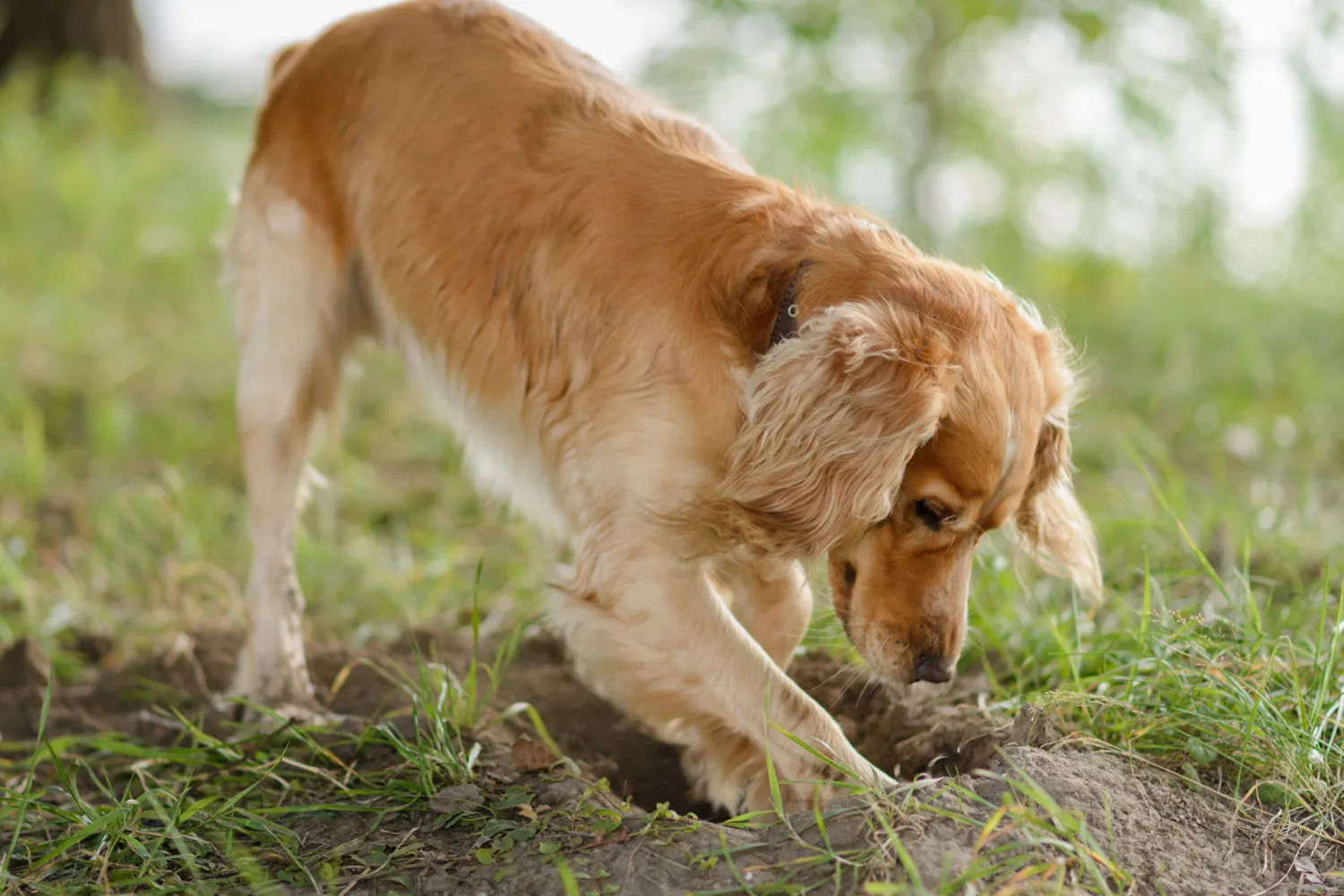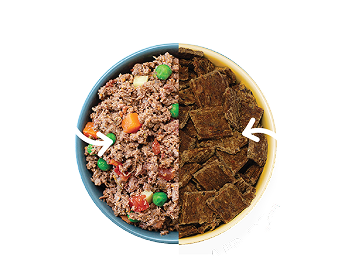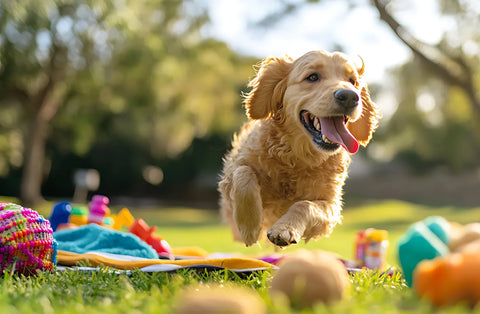
Why Do Dogs Bury Bones & Treats?
Ever caught your dog in the act of burying their prized bone in the backyard or tucking a favorite treat into the couch cushions? At A Pup Above, we're just as curious about these quirky canine behaviors as you are. It turns out this instinctual activity isn’t just amusing — it’s rooted in their DNA.
Curious why your dog seems to love hiding their goodies so much? We've got you covered. Read on to get the scoop on why your dog has a thing for hiding those prized snacks — and what it all means.
Why Do Dogs Bury Snacks?
Let's get right into it — why does your pup hide his favorite snacks in the garden or under the sofa pillows? Believe it or not, there are a few fascinating reasons behind this behavior that blend ancient instincts with their contemporary lives.
Ancestral Instincts
Dogs, much like their wolf ancestors, are natural-born survivors. In the wild, storing food for later is essential for survival, especially when hunting is good and meals are plentiful.
By burying bones and leftovers, they could ensure there was a backup meal available when leaner times hit. This instinctual behavior is hard-wired into even the most pampered pooch’s brain, showing that sometimes, old habits really do die hard.
Natural Preservation
Burying food also serves a practical purpose: preservation. By covering up their food with soil, early dogs could keep their food hidden from other predators and slow down the spoiling process with cooler underground temperatures.
Think of it as nature’s refrigerator! While your home’s backyard might not face the same wild threats, your dog’s behavior is a nod to their ancestors' clever survival strategies.
Territory Marking
Bones are a treasure worth guarding. When dogs bury their bones, it’s also a way of marking their territory, using their scent to signal to other animals that this stash belongs to them.
In today’s world, where many dogs share homes with other animals, the drive to secure their own stash can be compelling. This act of burying helps them feel more secure about their resources, ensuring they have something just for them hidden away.
How Should I Manage This Behavior?
Wondering if your dog’s burying habits should be a cause for concern? Don’t worry, it’s not necessarily a bad thing. However, if the digging and hiding are getting out of hand or causing disruption at home, there are some things you can try to manage this behavior effectively.
Provide Alternative Activities
Dogs often bury things when they have excess energy or are bored. Providing more physical exercise and mental stimulation can go a long way.
Engage your dog in more frequent play sessions, interactive games, and longer walks to help burn off that energy in a more constructive way. Toys that challenge them mentally, like puzzle feeders or treat-dispensing toys, can also keep their minds occupied and away from digging.
Create Designated Digging Zones
If your dog is really persistent about burying items, consider creating a designated digging zone in your yard. Fill a small sandbox or a specific area with soft soil or sand, and encourage your dog to bury items by hiding toys or treats for them to find. This not only satisfies their digging instinct but also keeps your garden intact.
Use Positive Reinforcement
When your dog chooses to play with toys or engage in activities that don’t involve burying, make sure to reward them. Positive reinforcement with treats, praise, or play can reinforce the behaviors you want to see. Over time, your dog will learn that these actions bring them rewards and attention, reducing their impulse to bury items around the house.
Address Stress
Sometimes, burying can be a sign of stress in dogs. Observe when and where your dog tends to bury items to understand if there might be underlying issues.
If your dog buries items when left alone, it might be a sign of separation anxiety. In such cases, consider consulting with a veterinarian or a dog behaviorist to address these deeper issues effectively.
Keep Valuable Items Out of Reach
To prevent your dog from burying important items like shoes or personal belongings, keep these items out of their reach. Ensuring that only dog-appropriate items are available for them to play with can help minimize unwanted burying behavior.
Which Breeds Bury Bones the Most?
If you suspect some dogs are master-level hide-and-seek players with their treats, you're spot on. A few breeds are particularly renowned for their digging and burying habits.
Here’s who makes the list:
- Jack Russell Terrier: Famed for their boundless energy and keen hunting instincts, these dogs often bury items as part of their natural behavior.
- Cairn Terrier: Another terrier breed known for their digging habits, they historically used these skills to hunt down burrowing animals.
- West Highland White Terrier: Similar to other terriers, Westies have a strong instinct to dig and bury, which was useful in their roles as rodent hunters.
- Beagle: As scent hounds, Beagles have a natural tendency to hide food for later, which can manifest as burying bones in the backyard.
- Dachshund: Originally bred to hunt badgers in their dens, Dachshunds use their digging skills to bury bones and treats.
- Basset Hound: Known for their laid-back nature but strong nose, Basset Hounds may bury items to save them for later, using their scent abilities to relocate their hidden treasures.
These breeds, among others with similar traits, often engage in burying behaviors that echo their ancestral hunting and survival tactics.
What Are the Best Bones for My Dog?
When it comes to treating your pup to some delicious bones, not all bones are created equal. We recommend sticking to bones that are safe, nutritious, and just the right size for your dog.
First off, always opt for raw bones rather than cooked. Cooked bones, especially poultry bones, can splinter easily and pose a choking hazard or cause internal damage.
For a safe bet, consider larger beef or bison bones that can stand up to your dog’s chewing. These bones are not only great for their dental health but also provide mental stimulation and stress relief. Make sure the size of the bone is appropriate for the size of your dog to avoid any risk of choking.
Additionally, incorporating bones with marrow can offer extra nutritional benefits, including vitamins, minerals, and essential fats that support your dog’s health. However, always introduce any new treat under supervision and in moderation to see how your dog’s digestive system handles it.
Remember, while bones can be a great addition to your dog’s diet, they should never replace a balanced meal plan — something we at A Pup Above take seriously. Our meals are designed to meet all of your pup's nutritional needs in a safe, tasty, and responsible way.
Conclusion
So, why exactly do dogs bury bones and treats? It's a fascinating mix of instinct, tradition, and sometimes just plain old fun.
From terriers to hounds, these clever canines carry on the practices of their ancestors, ensuring that their prized snacks are saved for later enjoyment. As dedicated dog parents ourselves, we understand the importance of satisfying not just their instinctual behaviors but their taste buds and health, too.
That’s why at A Pup Above, we craft human-grade, sous-vide meals that are as nutritious as they are delicious. Whether it's our savory Texas Beef Stew or the delightful Turkey Pawella, each meal is designed to give your dog the best — both above and below ground.
Dive into a bowl of A Pup Above today and watch your pup enjoy every bite — no burying required!
Sources:
How Wolf Became Dog | Scientific American
Separation Anxiety | American Humane
Fun and Educational Toys and Games for Dogs | American Kennel Club
Why Do Dogs Bury Bones? The Answer Is Surprisingly Simple | AKC
Top Stories

Why Do Dogs Lick Their Paws?

Why Do Dogs Whimper & Make Noises in Their Sleep?

Healthy Vet-Approved Homemade Dog Food Recipes

How To Cook Sweet Potatoes for Dogs






















